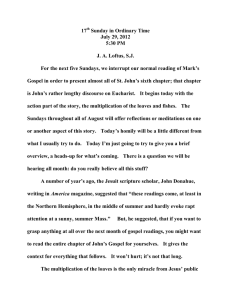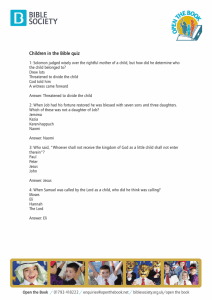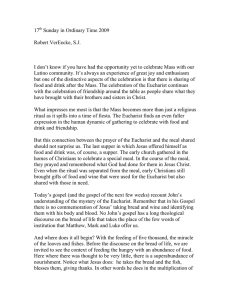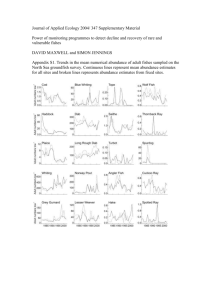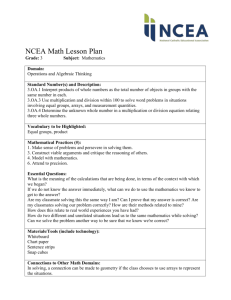17 Sunday in Ordinary Time July 26, 2009
advertisement
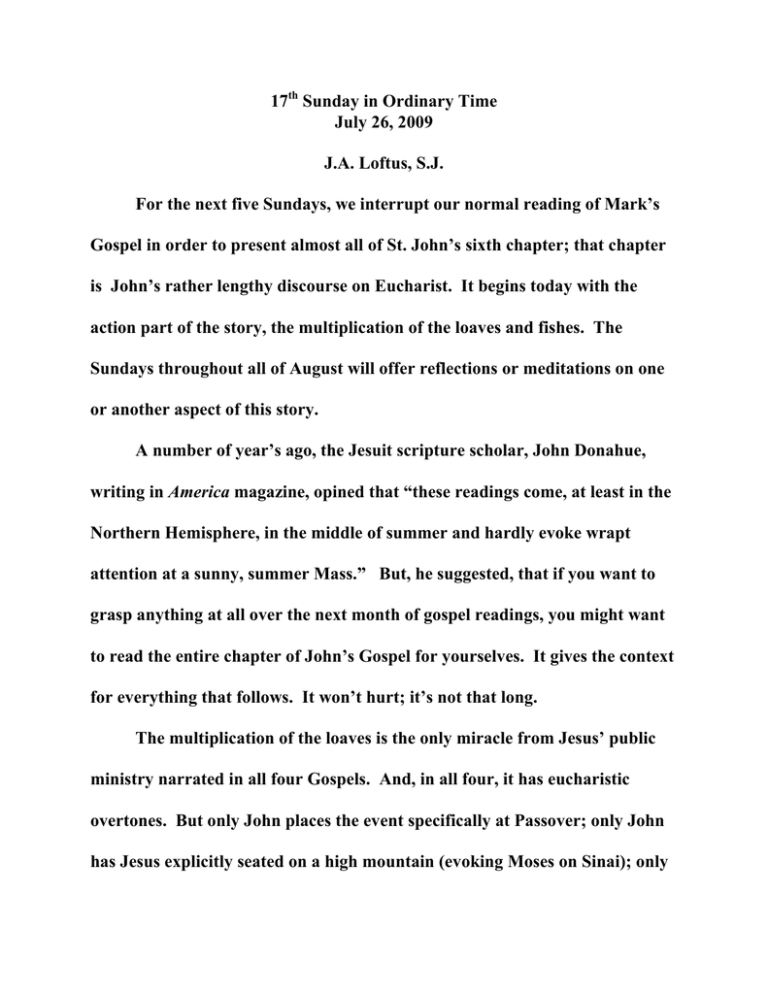
17th Sunday in Ordinary Time July 26, 2009 J.A. Loftus, S.J. For the next five Sundays, we interrupt our normal reading of Mark’s Gospel in order to present almost all of St. John’s sixth chapter; that chapter is John’s rather lengthy discourse on Eucharist. It begins today with the action part of the story, the multiplication of the loaves and fishes. The Sundays throughout all of August will offer reflections or meditations on one or another aspect of this story. A number of year’s ago, the Jesuit scripture scholar, John Donahue, writing in America magazine, opined that “these readings come, at least in the Northern Hemisphere, in the middle of summer and hardly evoke wrapt attention at a sunny, summer Mass.” But, he suggested, that if you want to grasp anything at all over the next month of gospel readings, you might want to read the entire chapter of John’s Gospel for yourselves. It gives the context for everything that follows. It won’t hurt; it’s not that long. The multiplication of the loaves is the only miracle from Jesus’ public ministry narrated in all four Gospels. And, in all four, it has eucharistic overtones. But only John places the event specifically at Passover; only John has Jesus explicitly seated on a high mountain (evoking Moses on Sinai); only John makes mention of Philip, the disciple who will later bring Greeks to Jesus anticipating the inclusion of non-Jews in the Eucharistic banquet. And John, alone, uses language explicitly evocative of the Last Supper. Jesus takes the loaves, gives thanks, and give them to the people. John alone also uses the Greek verb eucharisteo (“to give thanks”). So there can be no doubt what this miracle story is really about. In today’s readings, I just want to highlight one theme: the theme of abundance. The theme begins to be apparent in our first reading from the second book of Kings. The prophet Elisha is given 20 barley loaves with which to feed a hundred people. Recalling the previous promise of God that the people shall eat and there will always be something left over, Elisha repeatedly instructs the man to give it to the people, and trust the Lord. God does not just satisfy the hungry, offer bare sustenance in a famine situation. God will provide in abundance. So much so that there will always be something left over–to continue to share. Hence, in John’s version, each tribe of Israel receives its own wicker basket filled to the brim with more food for the journey, more abundance to be shared. God’s care, God’s love, is never miserly! But this is not, naturally speaking, a time of abundance for many 2 people. Our country and our world are in deep recession. People are trying just to marshal what resources they can find. We are networking for job opportunities, saving on food and entertainment, and cutting back (or at least preparing for cut backs) on many fronts. So how do we hear God’s story of abundance? How really? Today’s story of the multiplication of the loaves and fishes is a challenge to our everyday world of concerns and caution. It is also an invitation in our life of faith. Remember the lilies of the field; remember the birds of the air; remember the five thousand of hungry, hurting brothers and sisters who come before us. They ate their fill and had enough left over to continue sharing with each other. God’s promise, in John’s Gospel especially, is not for sustenance; not for survival; but for life in abundance. At this table, in a few minutes, we take the same bread and same cup. We bless them and give thanks–for all we do have, and for all God’s good things yet to come. We live in hope and in the Promise of God’s abundant life–life so often provided, surprisingly, by a little boy with only five loaves and only two fish. But that adds up to seven! A magical and sacred number. Abundanza! 3
